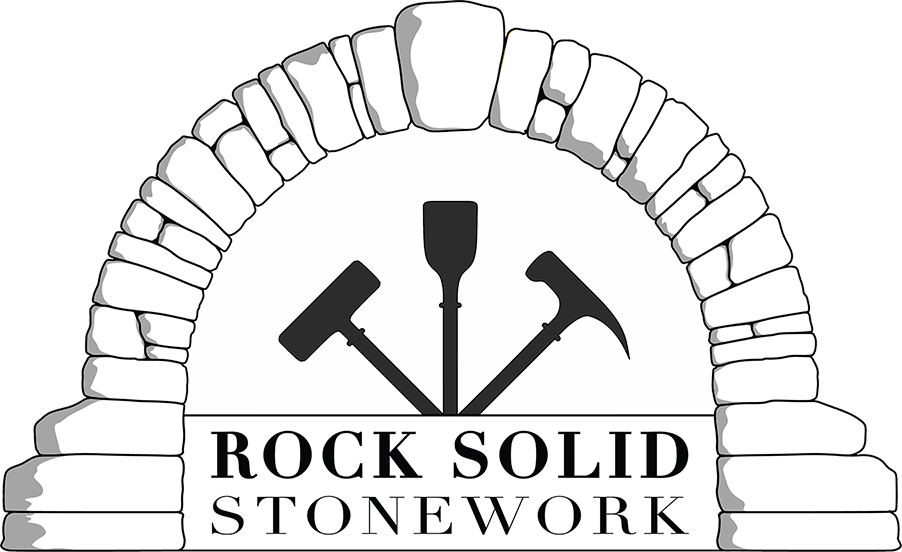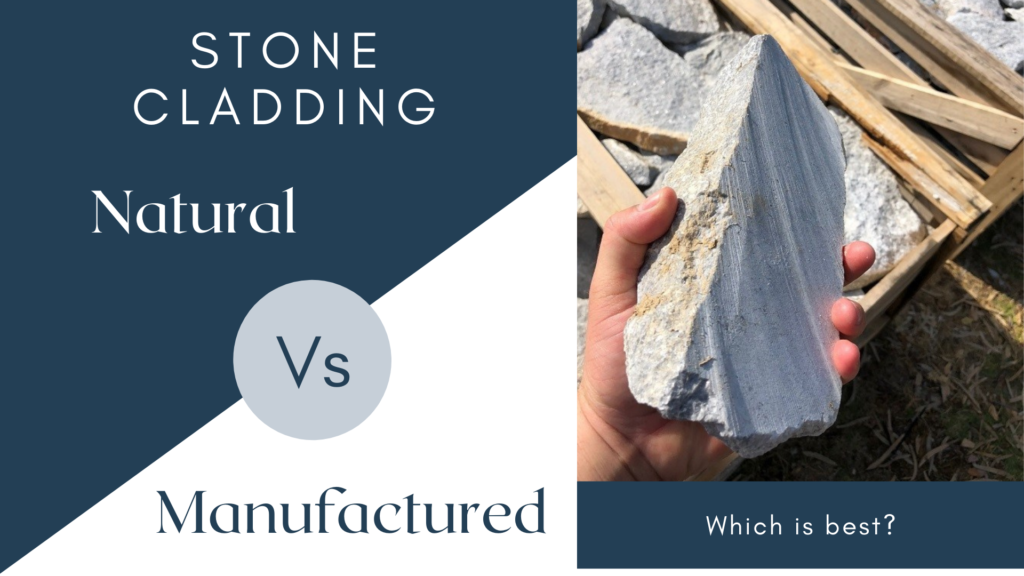Natural stone veneer is real stone quarried from the earth, with nothing added or removed, and then sliced into thin pieces to make veneer cladding. Manufactured or “cultured” stone is a man-made product designed to look like real stone. It is made by mixing concrete and aggregate materials that is then set into moulds and coloured to look like real stone.
Manufactured stone was introduced decades ago as an alternative to the thick and heavy natural stone that was previously used. It gained popularity due to its light weight, lower cost and easier installation, but this then pushed the natural stone market to improve their sawing process and produce a thinner, lighter veneer that exists today.
So, which one should you choose? There are a number of important differences between natural and manufactured stone, which we’ve outlined for you here.

APPEARANCE
Both natural and manufactured stone come in a wide variety of shapes and colours.
Natural stone gets its tones and colour variations from how the rock formed within the earth, thus resulting in a unique and authentic look. No two pieces of natural stone will ever be the same. It will not fade or change colour, even in direct sunlight or harsh weather conditions. Using a natural stone from the local area achieves a seamless tie-in with the nature that surrounds it.
Manufactured stone is available in a wider variety of styles, patterns and colours, as you aren’t limited to only the type of stone found locally. From afar, it may be difficult to tell manufactured stone from the real thing, but getting closer usually makes it pretty clear. You’ll often spot several identical pieces in the cladding and may notice some have a hand-painted finish. Some styles are trying to get the look as close to the real thing as possible, and some are simply embracing the man-made look. Manufactured stone’s colours can fade over time and do not last long when exposed to the elements. The inability to cut manufactured stone without seeing the aggregate edge means the stone pieces must be laid as they are and this can create gaps in the finished product.
DURABILITY
Natural stone is always going to outlast manufactured stone. Natural stone is an extremely durable material that can withstand the harshest of climates and severe weather. It is not vulnerable to basic deterioration and is hardly affected by normal day-to-day actions that would leave wear and tear on other construction materials. Natural stone resists moisture and heat and it will not warp, swell, bend, splinter, dent, melt or burn.
Manufactured stone can deteriorate over time, especially when exposed to outside elements such as rain, sunlight, dirt and wind. When used in direct sunlight, manufactured stone will lose its colour after just a few years.

COST
Many people assume there is a large difference in cost between natural stone and manufactured stone veneer. However this price difference may be smaller than you imagine.
Sure, you can find some fairly inexpensive options in man-made stone veneer, but this product is often extremely unauthentic-looking. You’ll find a lot of identical pieces that create a repetitive look and you will be able to tell it is not real stone from quite a distance. The closer you want the manufactured stone to resemble the real deal, the higher the price will be. The advancements in technology that has allowed for some high quality manufactured stone to closely resemble natural stone has driven up the price so much that the cost-saving benefit over natural stone has been virtually eliminated.
The cost to transport both manufactured stone and natural stone are relatively similar, despite the man-made stone being lighter. The lighter weight of manufactured stone can eliminate the need and expense of special footings and extra support on certain projects.
Depending on the type of cladding you choose, the cost of installing manufactured stone is usually slightly less than natural stone. This is due to the repetitive method of laying it and less cutting and chipping involved.
The maintenance cost of natural stone is less than manufactured. The man-made product cannot easily be pressure-washed clean like real stone can and also won’t withstand manual scrubbing. Cleaning manufactured stone is a lot more labour-intensive and will cost you a lot more in the long run than the low-maintenance natural stone.

If you’re looking to add value to your home, investing in natural stone will always win out over manufactured. Natural stone is consistently the first preference for architects and designers as it has a much higher perceived value.
When it first came on the scene, manufactured stone gained popularity due to being the more economical option for a similar outcome, but with the constant advancements in technology and processes, the price difference between high quality manufactured stone veneer and natural stone veneer is quite small. And when you factor in all of the added benefits that natural stone gives in comparison, that cost difference can be easily justified.
ECO-FRIENDLY
If being environmentally-conscious is a top priority, natural stone is definitely the best option of the two. Manufactured stone can be composed of harmful man-made chemicals. Not only does manufactured stone have a larger carbon footprint, but it is also susceptible to fungal staining and can develop efflorescence, leaving scaly white deposits on the surface. Natural stone, being a naturally-occurring material, requires no other materials or chemicals to create it and is fully sustainable and recyclable.
INSTALLATION
Both natural stone and manufactured stone come in panels, enabling easy installation. Manufactured stone is the easiest to install and is therefore the preferred option for DIY-ers. Natural stone can be cut easily and an experienced stonemason is able to ensure a tight finish with no gaps, whereas cutting manufactured stone will expose the aggregate edge, which means the end result may look quite gappy.
VERSATILITY

One of the key factors to consider when deciding between natural or manufactured stone veneer is its application limitations. While both types can be adhered to a number of different surfaces, natural stone’s heavy weight means it is limited to structural substrates such as brick, block or porous concrete. It cannot be adhered to drywall or other thin materials. Thus, in some instances, manufactured stone may be your only option due to its lighter weight and density. However, due to its inability to withstand natural elements such as rain, wind and sunlight, manufactured stone is not recommended for outdoor applications. Natural stone cladding can also be used for flooring, whereas manufactured stone cannot. Manufactured stone should also never be used around a pool as the chlorine can cause the product to discolour and weaken, leading to water damage.
THE VERDICT
There are both pros and cons to both natural and manufactured stone cladding. Usually the location and functionality of your project will dictate which of the two products you should choose (eg. If outside in direct natural elements, always choose natural stone, and if inside on a non-structural substrate, you’ll have to use the lighter manufactured stone). However, if ever you are faced with the ability to choose either material, natural stone will always be the preference of most designers and architects. Natural stone is the most authentic, most durable, most cost-effective and most eco-friendly. Whilst manufactured stone remains a popular choice due to its problem-solving abilities, you just can’t beat the real deal.


